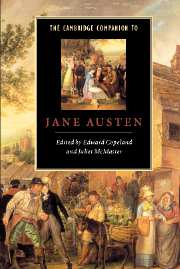Book contents
- Frontmatter
- 1 Chronology of Jane Austen's life
- 2 The professional woman writer
- 3 Northanger Abbey, Sense and Sensibility, Pride and Prejudice
- 4 Mansfield Park, Emma, Persuasion
- 5 The short fiction
- 6 The letters
- 7 Class
- 8 Money
- 9 Religion and politics
- 10 Style
- 11 Jane Austen and literary traditions
- 12 Austen cults and cultures
- 13 Further reading
- Index
10 - Style
Published online by Cambridge University Press: 28 May 2006
- Frontmatter
- 1 Chronology of Jane Austen's life
- 2 The professional woman writer
- 3 Northanger Abbey, Sense and Sensibility, Pride and Prejudice
- 4 Mansfield Park, Emma, Persuasion
- 5 The short fiction
- 6 The letters
- 7 Class
- 8 Money
- 9 Religion and politics
- 10 Style
- 11 Jane Austen and literary traditions
- 12 Austen cults and cultures
- 13 Further reading
- Index
Summary
Miss Crawford's countenance, as Julia spoke, might have amused a disinterested observer. She looked almost aghast under the new idea she was receiving. Fanny pitied her. 'How distressed she will be at what she said just now,' passed across her mind. (MP 89)
Although Julia Bertram's allusion to Edmund's forthcoming ordination is aimed at her sister and Henry Crawford, its most visible effect is on a bystander. The potency of the 'new idea' Mary Crawford is receiving is marked by the use of 'aghast', a strong word for Jane Austen, and soon afterwards by the reference to her 'rallying her spirits, and recovering her complexion'. It is also marked by the word 'idea', whose flat, modern sense of 'concept' was still enriched, in Jane Austen's use, by more pictorial connotations: Miss Crawford, the word suggests, gives one of life's long moments to a mental rehearsal of her comments on the clergy and Edmund's firm rejoinders. She then puts the question to him and, on hearing his plans, makes as graceful a gesture as her situation allows: 'If I had known this before, I would have spoken of the cloth with more respect' (89).
But the matter is too important to be dropped and she reverts to it as soon as courtesy permits: 'So you are to be a clergyman, Mr. Bertram. This is rather a surprise to me' (91). 'Surprise' is honest if low key, and the 'rather' plays it down. The anaphoric use of 'so' (where the word takes its weight from what has gone before and carries it on into the sequel) is more revealing. On this occasion it has an almost exclamatory force far removed from its ordinary task of tacking up loose syntax like that of Harriet Smith.
- Type
- Chapter
- Information
- The Cambridge Companion to Jane Austen , pp. 170 - 188Publisher: Cambridge University PressPrint publication year: 1997
- 4
- Cited by

